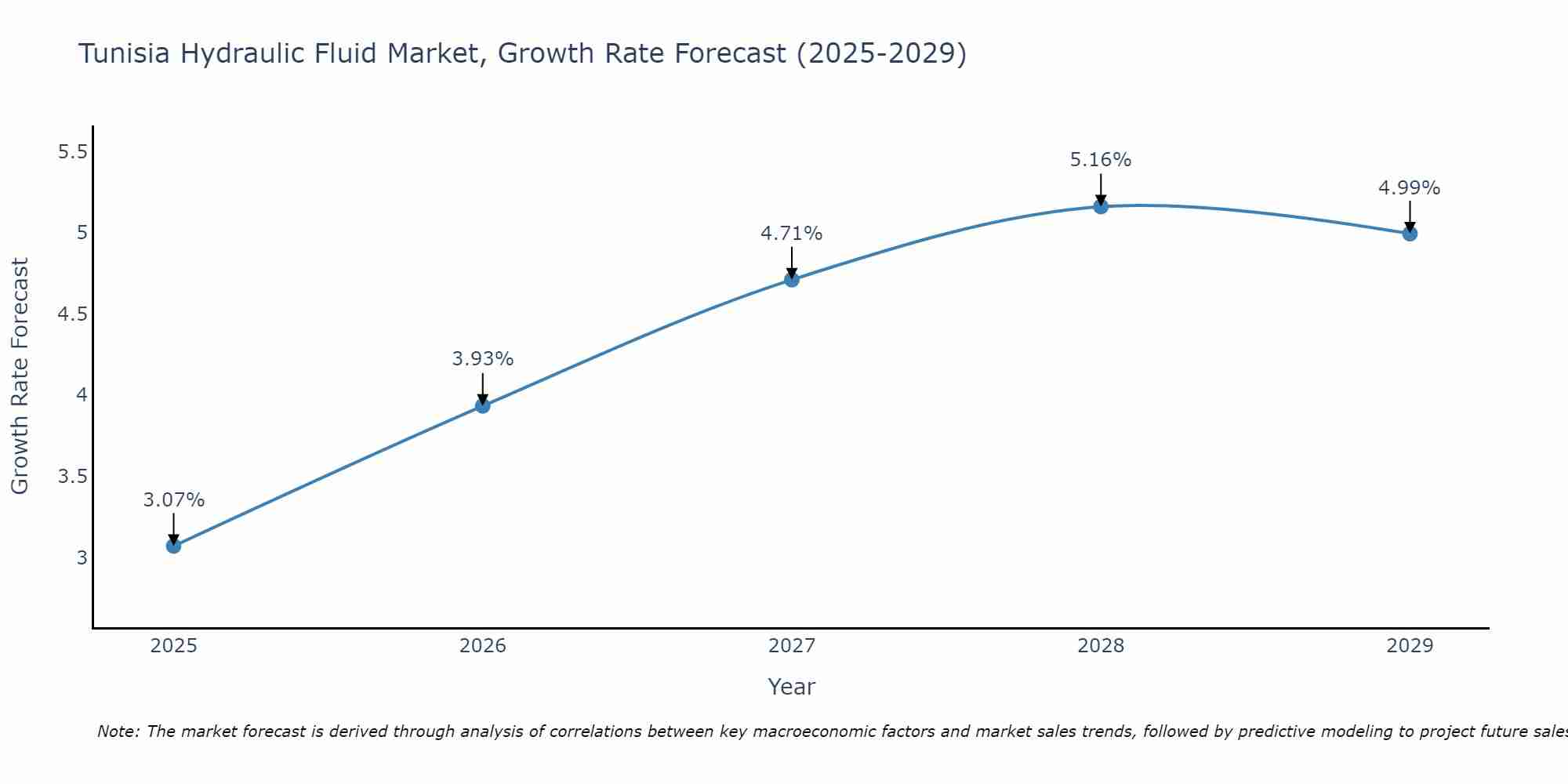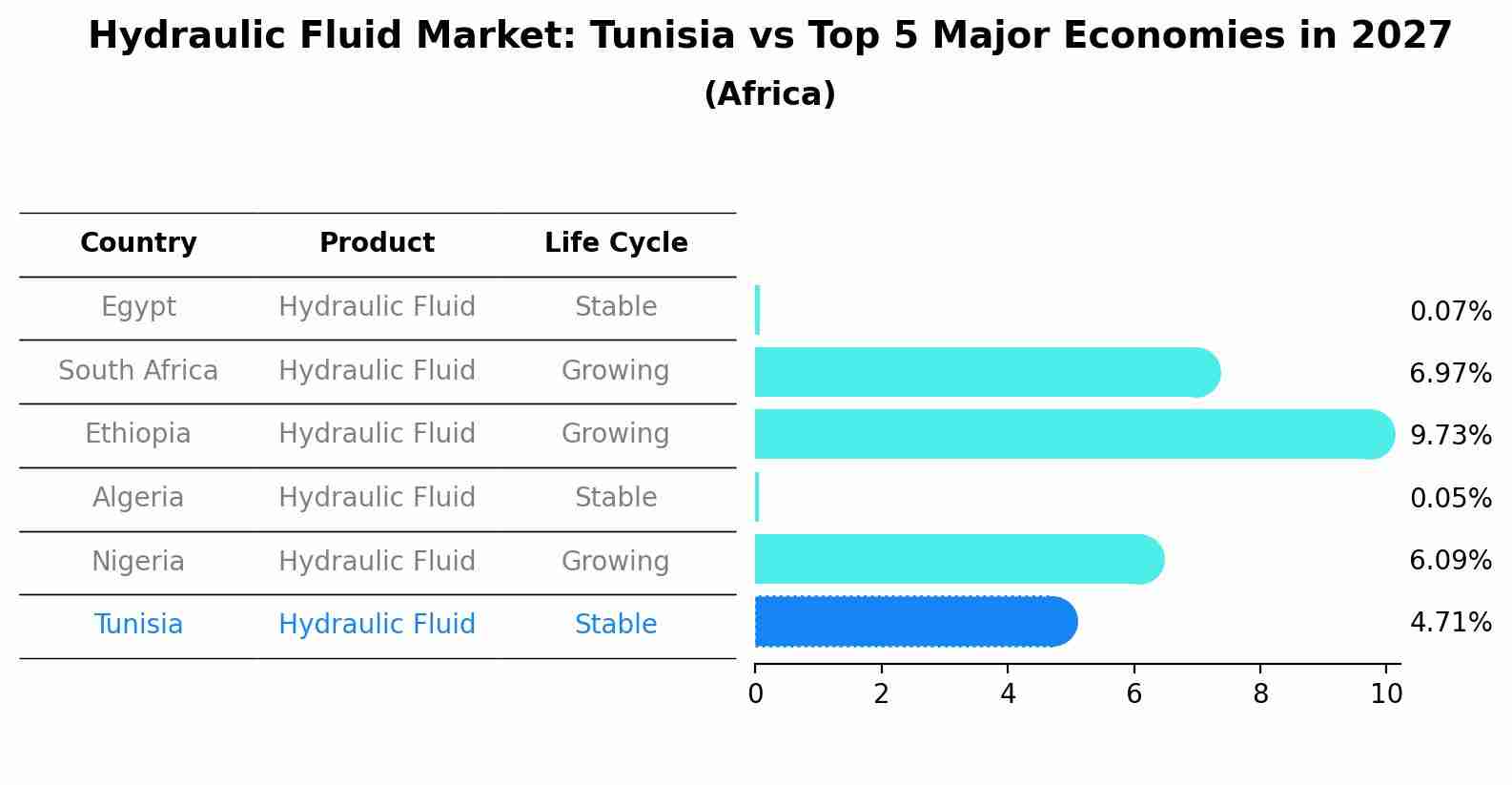Tunisia Hydraulic Fluid Market Outlook | Forecast, Growth, Size, Revenue, Trends, Industry, Value, Share, Analysis, COVID-19 IMPACT & Companies
| Product Code: ETC365154 | Publication Date: Aug 2022 | Updated Date: Aug 2025 | Product Type: Market Research Report | |
| Publisher: 6Wresearch | Author: Shubham Padhi | No. of Pages: 75 | No. of Figures: 35 | No. of Tables: 20 |
Tunisia Hydraulic Fluid Market Size Growth Rate
The Tunisia Hydraulic Fluid Market is projected to witness mixed growth rate patterns during 2025 to 2029. Starting at 3.07% in 2025, the market peaks at 5.16% in 2028, and settles at 4.99% by 2029.

Hydraulic Fluid Market: Tunisia vs Top 5 Major Economies in 2027 (Africa)
The Hydraulic Fluid market in Tunisia is projected to grow at a stable growth rate of 4.71% by 2027, highlighting the country's increasing focus on advanced technologies within the Africa region, where Egypt holds the dominant position, followed closely by South Africa, Ethiopia, Algeria and Nigeria, shaping overall regional demand.

Tunisia Hydraulic Fluid Market Overview
The hydraulic fluid market in Tunisia is expanding with demand from construction, mining, and manufacturing industries, emphasizing lubrication and performance under high-pressure environments to enhance equipment efficiency and longevity.
Drivers of the market
The hydraulic fluid market in Tunisia is influenced by industrial machinery, construction equipment, and automotive hydraulic system requirements for lubrication, power transmission, and temperature control. Demand for hydraulic fluids with superior viscosity, thermal stability, and wear protection properties supports equipment performance, reliability, and maintenance cost reduction.
Challenges of the market
The Hydraulic Fluid Market in Tunisia faces challenges related to high production costs and the need for advanced manufacturing processes. Ensuring the availability of high-quality raw materials at competitive prices is crucial for the growth of this market. Moreover, the market needs to invest in research and development to innovate and produce high-quality hydraulic fluids that meet the demands of various industries.
Government Policy of the market
The Tunisian government promotes the hydraulic fluid market by encouraging sustainable production and industrial innovation. Financial incentives are provided for companies manufacturing eco-friendly hydraulic fluids, and funding is allocated for research and development of new formulations. Regulatory frameworks are established to ensure that hydraulic fluids meet international quality and safety standards, facilitating their use in various industries such as construction, mining, and manufacturing.
Key Highlights of the Report:
- Tunisia Hydraulic Fluid Market Outlook
- Market Size of Tunisia Hydraulic Fluid Market, 2024
- Forecast of Tunisia Hydraulic Fluid Market, 2031
- Historical Data and Forecast of Tunisia Hydraulic Fluid Revenues & Volume for the Period 2018 - 2031
- Tunisia Hydraulic Fluid Market Trend Evolution
- Tunisia Hydraulic Fluid Market Drivers and Challenges
- Tunisia Hydraulic Fluid Price Trends
- Tunisia Hydraulic Fluid Porter's Five Forces
- Tunisia Hydraulic Fluid Industry Life Cycle
- Historical Data and Forecast of Tunisia Hydraulic Fluid Market Revenues & Volume By Base Oil for the Period 2018 - 2031
- Historical Data and Forecast of Tunisia Hydraulic Fluid Market Revenues & Volume By Synthetic Oil for the Period 2018 - 2031
- Historical Data and Forecast of Tunisia Hydraulic Fluid Market Revenues & Volume By Mineral Oil for the Period 2018 - 2031
- Historical Data and Forecast of Tunisia Hydraulic Fluid Market Revenues & Volume By Bio-based Oil for the Period 2018 - 2031
- Historical Data and Forecast of Tunisia Hydraulic Fluid Market Revenues & Volume By End Use for the Period 2018 - 2031
- Historical Data and Forecast of Tunisia Hydraulic Fluid Market Revenues & Volume By Oil & Gas for the Period 2018 - 2031
- Historical Data and Forecast of Tunisia Hydraulic Fluid Market Revenues & Volume By Marine for the Period 2018 - 2031
- Historical Data and Forecast of Tunisia Hydraulic Fluid Market Revenues & Volume By Automotive for the Period 2018 - 2031
- Historical Data and Forecast of Tunisia Hydraulic Fluid Market Revenues & Volume By Aerospace & defense for the Period 2018 - 2031
- Historical Data and Forecast of Tunisia Hydraulic Fluid Market Revenues & Volume By Construction for the Period 2018 - 2031
- Historical Data and Forecast of Tunisia Hydraulic Fluid Market Revenues & Volume By Others for the Period 2018 - 2031
- Tunisia Hydraulic Fluid Import Export Trade Statistics
- Market Opportunity Assessment By Base Oil
- Market Opportunity Assessment By End Use
- Tunisia Hydraulic Fluid Top Companies Market Share
- Tunisia Hydraulic Fluid Competitive Benchmarking By Technical and Operational Parameters
- Tunisia Hydraulic Fluid Company Profiles
- Tunisia Hydraulic Fluid Key Strategic Recommendations
Frequently Asked Questions About the Market Study (FAQs):
- Single User License$ 1,995
- Department License$ 2,400
- Site License$ 3,120
- Global License$ 3,795
Search
Related Reports
- ASEAN and Thailand Brain Health Supplements Market (2025-2031) | Strategy, Consumer Insights, Analysis, Investment Trends, Opportunities, Growth, Size, Share, Industry, Revenue, Segments, Value, Segmentation, Supply, Forecast, Restraints, Outlook, Competition, Drivers, Trends, Demand, Pricing Analysis, Competitive, Strategic Insights, Companies, Challenges
- ASEAN Bearings Market (2025-2031) | Strategy, Consumer Insights, Analysis, Investment Trends, Opportunities, Growth, Size, Share, Industry, Revenue, Segments, Value, Segmentation, Supply, Forecast, Restraints, Outlook, Competition, Drivers, Trends, Demand, Pricing Analysis, Competitive, Strategic Insights, Companies, Challenges
- Europe Flooring Market (2025-2031) | Outlook, Share, Industry, Trends, Forecast, Companies, Revenue, Size, Analysis, Growth & Value
- Saudi Arabia Manlift Market (2025-2031) | Outlook, Size, Growth, Trends, Companies, Industry, Revenue, Value, Share, Forecast & Analysis
- Uganda Excavator, Crane, and Wheel Loaders Market (2025-2031) | Strategy, Consumer Insights, Analysis, Investment Trends, Opportunities, Growth, Size, Share, Industry, Revenue, Segments, Value, Segmentation, Supply, Forecast, Restraints, Outlook, Competition, Drivers, Trends, Demand, Pricing Analysis, Competitive, Strategic Insights, Companies, Challenges
- Rwanda Excavator, Crane, and Wheel Loaders Market (2025-2031) | Strategy, Consumer Insights, Analysis, Investment Trends, Opportunities, Growth, Size, Share, Industry, Revenue, Segments, Value, Segmentation, Supply, Forecast, Restraints, Outlook, Competition, Drivers, Trends, Demand, Pricing Analysis, Competitive, Strategic Insights, Companies, Challenges
- Kenya Excavator, Crane, and Wheel Loaders Market (2025-2031) | Strategy, Consumer Insights, Analysis, Investment Trends, Opportunities, Growth, Size, Share, Industry, Revenue, Segments, Value, Segmentation, Supply, Forecast, Restraints, Outlook, Competition, Drivers, Trends, Demand, Pricing Analysis, Competitive, Strategic Insights, Companies, Challenges
- Angola Excavator, Crane, and Wheel Loaders Market (2025-2031) | Strategy, Consumer Insights, Analysis, Investment Trends, Opportunities, Growth, Size, Share, Industry, Revenue, Segments, Value, Segmentation, Supply, Forecast, Restraints, Outlook, Competition, Drivers, Trends, Demand, Pricing Analysis, Competitive, Strategic Insights, Companies, Challenges
- Israel Intelligent Transport System Market (2025-2031) | Strategy, Consumer Insights, Analysis, Investment Trends, Opportunities, Growth, Size, Share, Industry, Revenue, Segments, Value, Segmentation, Supply, Forecast, Restraints, Outlook, Competition, Drivers, Trends, Demand, Pricing Analysis, Competitive, Strategic Insights, Companies, Challenges
- Uganda Precast and Aggregate Market (2025-2031) | Strategy, Consumer Insights, Analysis, Investment Trends, Opportunities, Growth, Size, Share, Industry, Revenue, Segments, Value, Segmentation, Supply, Forecast, Restraints, Outlook, Competition, Drivers, Trends, Demand, Pricing Analysis, Competitive, Strategic Insights, Companies, Challenges
Industry Events and Analyst Meet
Our Clients
Whitepaper
- Middle East & Africa Commercial Security Market Click here to view more.
- Middle East & Africa Fire Safety Systems & Equipment Market Click here to view more.
- GCC Drone Market Click here to view more.
- Middle East Lighting Fixture Market Click here to view more.
- GCC Physical & Perimeter Security Market Click here to view more.
6WResearch In News
- Doha a strategic location for EV manufacturing hub: IPA Qatar
- Demand for luxury TVs surging in the GCC, says Samsung
- Empowering Growth: The Thriving Journey of Bangladesh’s Cable Industry
- Demand for luxury TVs surging in the GCC, says Samsung
- Video call with a traditional healer? Once unthinkable, it’s now common in South Africa
- Intelligent Buildings To Smooth GCC’s Path To Net Zero













